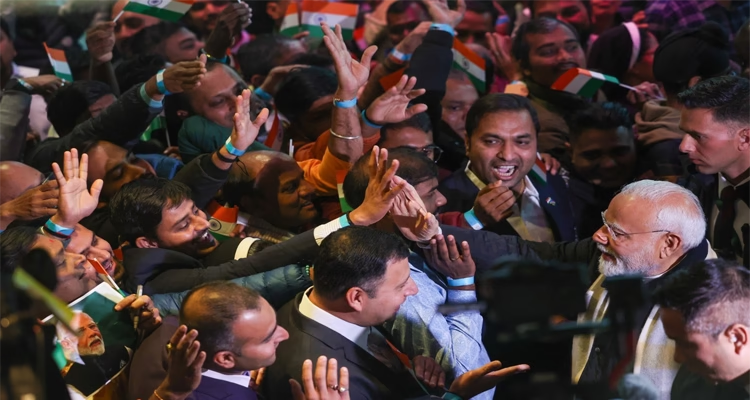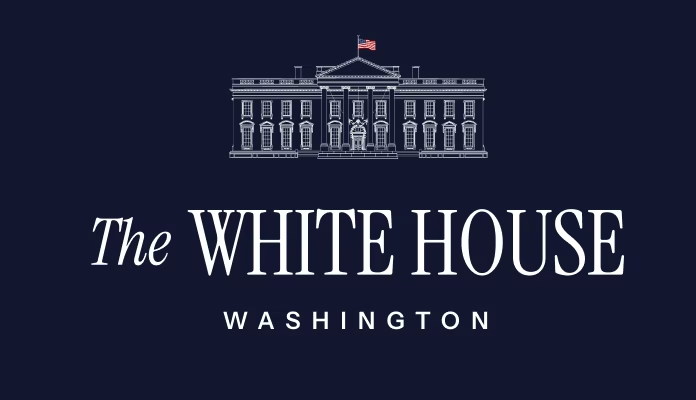
Windhoek, Namibia: Prime Minister Narendra Modi arrived in Windhoek on Tuesday morning, marking the final stop of his five-nation diplomatic tour that included Ghana, Trinidad & Tobago, Argentina, Brazil, and now Namibia. This is Modi’s first visit to Namibia—and only the third by any Indian Prime Minister to the southern African nation in three decades.
Modi was received with full ceremonial honours at Hosea Kutako International Airport and later welcomed by enthusiastic members of the Indian diaspora with garba performances and yoga demonstrations at Hilton Hotel.
The Prime Minister’s visit, at the invitation of President Netumbo Nandi-Ndaitwah, holds deep strategic and symbolic significance. He is expected to hold high-level delegation talks at Namibia’s State House and sign a series of Memoranda of Understanding (MoUs) aimed at boosting cooperation in key sectors—energy, healthcare, digital education, and defence.
The Indian community in Namibia is extremely optimistic about closer India-Namibia friendship and this reflected in the special welcome in Windhoek. I am extremely proud of our diaspora, particularly the manner in which they have retained a connect with their culture and… pic.twitter.com/95eJSdA510
— Narendra Modi (@narendramodi) July 9, 2025
In a significant gesture, Namibia will confer its highest civilian honour on PM Modi for his contributions to strengthening bilateral ties. He is also scheduled to pay tribute to Namibia’s Founding Father, Dr. Sam Nujoma, and address the Namibian Parliament later in the day—a rare honour for any foreign leader.
Why Namibia Matters to India
Namibia’s vast mineral wealth is of keen interest to India. The country is the world’s third-largest uranium producer, a critical resource for India’s growing fleet of nuclear power plants. According to government sources, India plans to import over 9,000 metric tonnes of uranium by 2033 under its National Nuclear Energy Mission, and Namibia could play a vital role in that strategy.
India’s High Commissioner to Namibia, Rahul Shrivastava, confirmed that talks on direct uranium exports are underway. Also on the radar are Namibia’s marine diamond reserves—among the richest in the world. Currently, Namibian diamonds reach India through Europe; Modi is expected to initiate groundwork for direct trade routes.
Beyond minerals, Namibia’s recent oil and gas discoveries have piqued India’s interest, potentially opening new avenues for energy cooperation.
Trade, Tech & Training
Bilateral trade between India and Namibia has seen a sharp rise—jumping from $278 million in 2022-23 to $654 million in just eight months of the 2023 fiscal. Modi’s visit is expected to lay the foundation for further growth, particularly in IT, healthcare, education, and defence.
India is establishing a Centre of Excellence in IT in Windhoek to train Namibian youth and officials in cybersecurity and digital governance. In defence, India is offering training for Namibian officers and exploring collaboration on non-lethal military technologies and logistics.
Namibia and India also share a unique wildlife connection. In 2022, eight cheetahs were translocated from Namibia to India’s Kuno National Park—marking the world’s first intercontinental carnivore relocation, an initiative personally launched by PM Modi.
Strategically, analysts see Modi’s outreach as part of India’s broader effort to counterbalance China’s growing footprint in Africa. Namibia, a long-time partner of Beijing, joined China’s Belt and Road Initiative in 2018 and remains a vocal supporter of the One China policy.
Modi’s visit aims to present India as a credible alternative partner, focusing on mutual growth, capacity-building, and people-centric cooperation.




